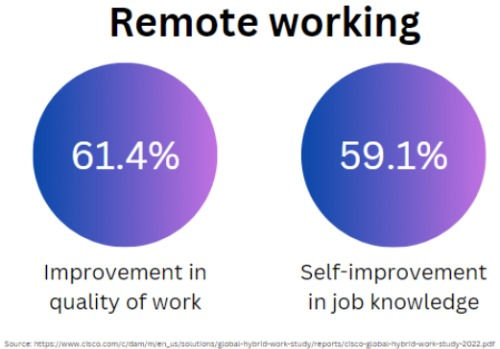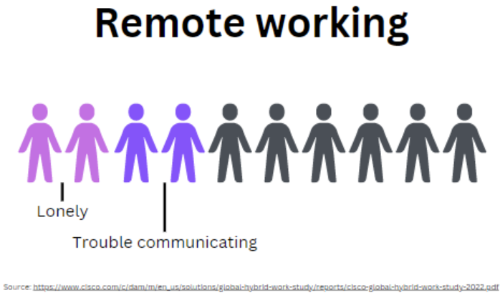
Unlocking the Power of Gen Z's New Working Culture
The pandemic has dramatically changed the way we work, and I have adapted to the new culture of remote work, be it a fully remote schedule or a hybrid schedule. Growing up with technology, I find myself more efficient and productive when working from home. Nonetheless, recently, a friend of mine complained to me about how he had been compelled to go back to the workplace, resulting in feelings of tension and unease. The two-hour commute to work drains his energy, making it difficult to complete his work during the usual 9am - 6pm office hours. He went on about how everyday is a battle… He has to make sure he gets out of bed early enough to beat the rush hour so he gets to clock in at work on time, attend a bunch of meetings which may or may not be necessarily held, entertain small talk in the office, and by the time he actually gets to do some real work, it’s almost 6pm. To put it simply, he feels like a fish out of water scurrying around chasing deadlines. If you were thinking… who’s this “snowflake” complaining? He is a member of Gen Z but I do not believe that those sentiments are his alone.
Fun fact: Fun fact! It has been reported that Gen Zers are the least likely to enjoy a fully remote work schedule as they are fresh out of school and prefer to have social interactions with their colleagues but 41% of those in their 50s and 60s want to work from home full time.
Now comes the opinion from a fellow Gen Z that you didn’t ask for…
I think it is about time companies recognize that traditional ways of working are no longer effective. If employers want their employees to work productively , they need to embrace remote/hybrid work as a viable option. Forcing employees who don’t particularly enjoy working from the office cannot possibly be sustainable. It is exactly such behavior that leads to phenomena like "quiet quitting", burnout, disengagement and more. A study that was done on over 1000 Google employees has shown that two-thirds are unhappy about being forced to work in the office. It is crucial to heed the needs of your workforce, inspire, mentor, and motivate them to create a sustainable future for themselves and your organisation. Failure to adapt to new work cultures will make it challenging for companies to retain talent, regardless whether they are from my generation or older.
If employers insist on sticking to the old ways or are of the opinion that a hybrid work schedule wouldn’t work for organisations of their nature, they could consider offering benefits such as free parking, paid public transport fares, organising more social events, and setting flexible work hours. These benefits can help reduce the employees’ financial stress and be less burdened by a rigid schedule which will in turn allow employees to feel refreshed at work. The financial assistance could also help employees have more disposable income to invest in activities that enhance their overall well-being. These are attributes of a future proofed organisation which clearly demonstrates care and concern for its people.
Nonetheless, please read on to assess for yourself whether you think your organisation should adopt a hybrid work schedule.
3 reasons why Hybrid Working is the way forward
1. Flexibility and autonomy
Hybrid working provides employees with the flexibility and autonomy they need to achieve a better work-life balance.

A recent survey by Cisco revealed that 61% of remote workers reported an improvement in the quality of their work, with a similar percentage experiencing self-improvement in job knowledge. I believe this is because remote work offers greater flexibility and control over one’s work environment, allowing them to choose a workspace that suits their needs. For me, that could mean working from my home office or heading to a local coffee shop to switch up my surroundings. This freedom can lead to less stress and fewer distractions, which helps me stay focused and productive throughout the day. Overall, I believe that remote work has allowed me to be more efficient and effective in my work, and I can see how it could benefit others as well.
2. Cost savings
The Global Workplace Analytics show that working remotely for just half of the time can save over $700 billion annually, amounting to more than $11,000 per employee per year for remote-work-compatible jobs. If this isn’t significant, I don’t know what is! Post-pandemic, both employers and employees have begun to see the benefits of remote working and there’s no turning back. Companies can save on expenses such as office rent, utilities, and other operational costs, while employees can save on commuting expenses and other associated costs of in-person work. This reduced financial burden can improve the financial stability of companies and provide employees with more financial resources which would potentially lead to increased job satisfaction.
3. Improved employee engagement and productivity

7 out of 10 respondents to a global survey that covered Singapore, Malaysia, Indonesia, and the Philippines believe that hybrid work environments increase productivity and creativity. According to Gallup, employees who work remotely at least part of the time are more engaged than those who work in the office all the time. This is because hybrid work allows employees to work in a way that best suits their needs and preferences. It also allows them to better balance their personal and professional responsibilities, leading to increased productivity, job satisfaction, and improved overall well-being.
3 Downsides of Hybrid Work Environment
As someone who has had the opportunity to work in a hybrid environment, I can attest to the benefits of having the flexibility to choose when and where I work. But, as with everything in life, there are downsides to this arrangement that we cannot ignore.
1. No work life separation
One of the major drawbacks of hybrid work is the potential physical health issues that can arise from the lack of work life separation. According to a recent survey by Upright Pose, one in three workers spend their entire day sitting in their chairs, with over 60% of them only getting up to use the restroom or grab a snack. It is shocking to know that around 24% of people who work remotely do not step out of their houses at all. A more concerning fact is that around 82% of workers under 35 years of age have experienced physical health issues for the first time in the past year, and 67% of them have sought medical attention to address these problems. This inability to draw boundaries and set clear expectations can lead to significant health problems. Thus, in order for a hybrid work arrangement to work, organisations need to plan ahead the execution as well as adopt the necessary infrastructure to ensure business and employee well-being are not negatively affected.
2. Disconnection

While remote work can offer flexibility and autonomy, it can also lead to employees feeling disconnected from their colleagues and company culture. A survey by Buffer found that 20% of remote workers struggle with loneliness, while 17% struggle with communication. This highlights the need for employers to prioritize communication and collaboration among their remote teams. It's also important for employees to take proactive steps to stay connected with colleagues, such as scheduling regular check-ins and participating in virtual team-building activities.
3. Increased stress and anxiety

A recent research by Cigna showed that 95% of Gen Z respondents in Singapore experience stress due to virtual overload or fatigue. I can relate to this as I constantly find myself checking emails and messages outside of work hours. The blurred boundaries between work and personal life make it hard to switch off and relax, which can lead to burnout and increased stress. Let's also not forget the constant notifications from co-workers that know no bounds which makes it all even more overwhelming. Or the manager who doesn’t trust that his team members are getting work done and thus starts micromanaging. It's clear that hybrid work can be a recipe for stress, anxiety, and even depression, especially for us younger workers who may lack the coping mechanisms to deal with these challenges. Again, proper execution is key if an organisation chooses to offer a hybrid working arrangement to its employees.
Conclusion
In conclusion, the Future of Work is rapidly evolving, and companies must adapt to be sustainable and stay ahead of the curve. An EY report has shown that six in ten of SEA respondents would quit their jobs if not provided post-pandemic flexibility. Clearly, change needs to take place, the question is how?
"The challenge for every SEA organization is how to institute a hybrid work policy with any success while also trying to profitably run a business amidst an economy that is most decidedly unpredictable.” - Manatal
Hybrid work arrangements offer the flexibility and work-life balance that people across generations desire. While there are potential downsides to this work arrangement, such as reduced productivity, feelings of isolation and disconnection, and increased stress and anxiety, these can be mitigated with effective communication, collaboration, and support amongst team members within an organisation.
With the right leadership, culture, structure and procedures in place, such adaptation is not impossible. Your biggest question now may be, what do you mean by “right”? “Right” is very subjective as answering this question requires a deeper understanding of your organisation and its current culture and people. However, in brief, for a hybrid work arrangement to be effective, companies need to practice Generative Leadership and cultivate a Generative Culture. In the context of hybrid working, Generative Leadership is when leaders trust their employees and give them the autonomy to perform their daily work obligations. A Generative Culture is one where employees feel intrinsically motivated to work and perform well. More information about the topics of Generative Culture and Leadership can be found in an upcoming book, “Future Shaping”, written by the Founder and CEO of Optimal Insight. Keep your eyes peeled!
Optimal Insight, as a consulting firm specializing in workplace management and optimization, can provide valuable guidance to organizations transitioning to hybrid work arrangements. Your organisation can leverage Optimal Insight’s expertise in organizational design, change management, and employee engagement to help navigate the transition to hybrid work. If you would like to know if your organisation is ready for this transition and obtain some information on how to do it, book yourself a consultation through our website at www.optimalinsight.org or contact us at contact@optimalinsight.org. We will be thrilled to be a part of your journey in future proofing your organisation!
Now a question for you to ponder… do you think my friend would choose an organisation that offers him the flexibility of hybrid work or stay with this company he’s at if both offered the exact same benefits and growth opportunities?
Sagesh Rohan

Sagesh is a student pursuing a diploma in Business Management at Reliance College and currently working as an intern at Optimal Insights. As an intern, Sagesh is responsible for creating content and supporting marketing campaigns for OI subsidiaries, as well as managing administrative tasks such as scheduling and processing payments. With expertise in Marketing, Human Resources, and Administration, Sagesh possesses a diverse set of skills that can be applied to various workplaces.
